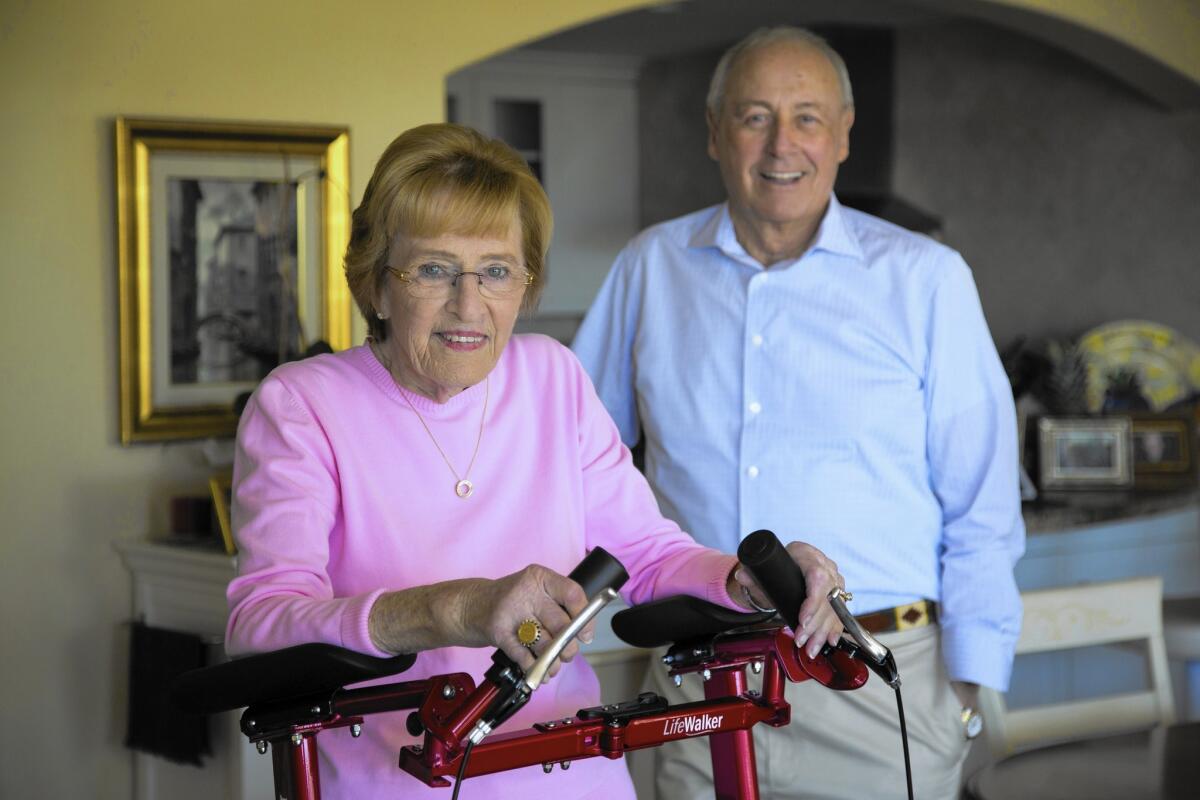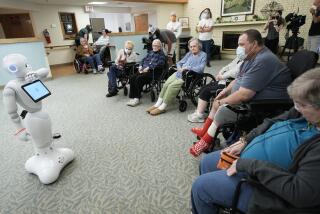Cutting Edge: ProtoStar’s high-tech medical walker, the LifeWalker Upright, provides more than mobility

Jean Purcell uses the LifeWalker, an upright medical walker designed by her husband, David Purcell, right, founder and CEO of ProtoStar, the San Diego company that makes the LifeWalker.
From the iconoclastic VW Beetle to the swanky Mercedes-Benz, the vehicle of choice for baby boomers has followed the arc of their lives. As members of that generation edge into elderhood, they’re increasingly adopting another mobility device: a medical walker.
Boomers are twice as likely to use walkers and other ambulatory devices than the previous generation — 6.9% versus 3.3% — according to a 2013 study published in the Journal of the American Medical Assn.
The global market for these devices is projected to nearly double in size from 2013 to 2020, to $8 billion annually. And medical equipment manufacturers are trying to offer an array of options, including walkers, crutches, canes, wheelchairs, scooters, “rollators” and more.
One new entrant to the market is San Diego company ProtoStar. Its product, the LifeWalker Upright, is marketed as not only providing mobility and protection from falls but also something precious to people as they age: dignity.
The LifeWalker makes it easier for users to look straight ahead at other people, not down at the pavement, said David Purcell, the founder and chief executive of ProtoStar. The adjustable, wheeled walker fits around the user on three sides, enabling it and the person to travel together. Its special characteristics, including shock absorbers, caliper brakes and arm rests, are designed to offer comfort and impart confidence in walking.
Purcell said he and other investors are filling an unmet need for products designed with the user in mind, based on scientific principles governing human locomotion.
ProtoStar faces an uphill struggle because of the competition in an established market, said mobility researcher James Lenker, an associate professor in the department of rehabilitation science at the University at Buffalo. The LifeWalker Upright’s price point of nearly $1,800 is also a deterrent.
“In the U.S., people with disabilities are among the lowest incomes, as a group, of any demographic,” he said. “So this is clearly a product targeting wealthy people. It’s not going to be something that the average 80-year-old with degenerative joint disease or arthritis or recovering from a stroke will typically be able to afford.”
Even consumers who can afford that price might find it more attractive to buy a powered scooter, Lenker said. That would provide superior mobility to get around the community and perform everyday tasks like shopping.
Or for a few hundred dollars, people could buy an adjustable walker to be used in addition to a powered scooter.
The true test will come in the marketplace, where customers will judge whether the device’s features make it worth the cost. The LifeWalker Upright is in pre-production stage as its final form takes shape.
For Purcell, inspiration for the LifeWalker came from personal need. His wife, Jean, is in her 70s and dealing with rheumatoid arthritis, a movement disorder called cerebellar ataxia, a spine condition called rotoscoliosis and chronic obstructive pulmonary disease, or COPD.
Jean Purcell said she repeatedly fell while using her old walker. She also found herself looking downward, in a slouched posture that she disliked.
That’s when her husband, a retired electronics inventor who founded the San Diego printer maker Encad, stepped in. Drawing on his engineering expertise, David Purcell researched how walkers function and decided to design one.
His invention gained support from some of the most respected biomedical professionals and investors in San Diego. ProtoStar’s board members include Peter Farrell, the founder of ResMed; Dr. Drew Senyei, managing director of Enterprise Partners; and Dr. Steven Garfin, chair of UC San Diego’s orthopedic surgery department.
ProtoStar plans to introduce LifeWalker Upright at this week’s meeting of the American Physical Therapy Assn. in Anaheim. The device will be sold directly to consumers via the company’s website and phone number.
The $1,795 price is not reimbursable by medical insurance, although ProtoStar plans studies to assess the device’s medical benefits. If the research confirms certain benefits, then ProtoStar can legally make various marketing claims.
Jean Purcell said she feels a benefit. She had trouble maintaining balance with previous walkers, which are often jury-rigged with tennis balls for easier sliding.
“They’re very hard to work with and they’re not secure at all,” she said. She then went to wheeled walkers with seats, but they also had drawbacks.
“You have to lean over like you would with a grocery cart,” she said. “Pretty soon, your back begins to curve and it affects your breathing and your heart, because you’re not standing up straight and you’re looking at the ground.”
The slouched posture is known to cause problems, David Purcell said.
“It’s unsafe and there are thousands of people who fall from their walkers every year and end up in the ER,” he said. “I was in the manufacturing business and I thought I could design something better than that. So I spent a year doing drawings and analysis of Jean’s gait and her problems, and doing ergonomic studies, human factors, research, photos of her in the optimum positions, measurements.”
At the end of the process, Purcell said, he was convinced that his invention could help others, not just his wife.
Garfin, the UC San Diego orthopedic surgeon, said an upright posture helps takes weight off the heart and lungs. But scientific testing will need to be done before claims can be made about that aspect of the LifeWalker Upright.
Testing is also being done to see if use of the device can relieve pain and reduce the weight load on joints.
ProtoStar has run on private investment so far, David Purcell said. The company is seeking to raise about $3 million in venture capital in the next month or so.
bradley.fikes@sduniontribune.com
Twitter: @sandiegoscience






